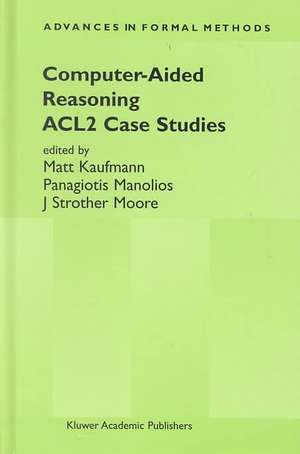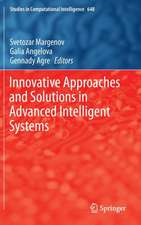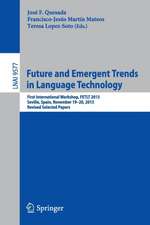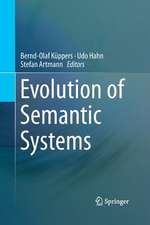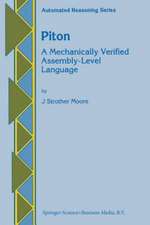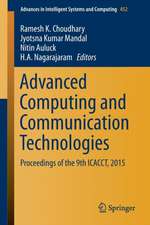Computer-Aided Reasoning: ACL2 Case Studies: Advances in Formal Methods, cartea 4
Editat de Matt Kaufmann, Panagiotis Manolios, J Strother Mooreen Limba Engleză Hardback – 30 iun 2000
Computer-Aided Reasoning: ACL2 Case Studies is meant for two audiences: those looking for innovative ways to design, build, and maintain hardware and software systems faster and more reliably, and those wishing to learn how to do this. The former audience includes project managers and students in survey-oriented courses. The latter audience includes students and professionals pursuing rigorous approaches to hardware and software engineering or formal methods. Computer-Aided Reasoning: ACL2 Case Studies can be used in graduate and upper-division undergraduate courses on Software Engineering, Formal Methods, Hardware Design, Theory of Computation, Artificial Intelligence, and Automated Reasoning.
The book is divided into two parts. Part I begins with a discussion of the effort involved in using ACL2. It also contains a brief introduction to the ACL2 logic and its mechanization, which is intended to give the reader sufficient background to read the case studies. A more thorough, textbook introduction to ACL2 may be found in the companion book, Computer-Aided Reasoning: An Approach.
The heart of the book is Part II, where the case studies are presented. The case studies contain exercises whose solutions are on the Web. In addition, the complete ACL2 scripts necessary to formalize the models and prove all the properties discussed are on the Web. For example, when we say that one of the case studies formalizes a floating-point multiplier and proves it correct, we mean that not only can you read an English description of the model and how it was proved correct, but you can obtain the entire formal content of the project and replay the proofs, if you wish, with your copy of ACL2.
ACL2 may be obtained from its home page. The results reported in each case study, as ACL2 input scripts, as well as exercise solutions for both books, are available from this page.
| Toate formatele și edițiile | Preț | Express |
|---|---|---|
| Paperback (1) | 1274.57 lei 6-8 săpt. | |
| Springer Us – 8 dec 2010 | 1274.57 lei 6-8 săpt. | |
| Hardback (1) | 1281.35 lei 6-8 săpt. | |
| Springer Us – 30 iun 2000 | 1281.35 lei 6-8 săpt. |
Preț: 1281.35 lei
Preț vechi: 1601.68 lei
-20% Nou
Puncte Express: 1922
Preț estimativ în valută:
245.20€ • 257.83$ • 202.60£
245.20€ • 257.83$ • 202.60£
Carte tipărită la comandă
Livrare economică 17 aprilie-01 mai
Preluare comenzi: 021 569.72.76
Specificații
ISBN-13: 9780792378495
ISBN-10: 0792378490
Pagini: 337
Ilustrații: XV, 337 p.
Dimensiuni: 155 x 235 x 21 mm
Greutate: 0.69 kg
Ediția:2000
Editura: Springer Us
Colecția Springer
Seria Advances in Formal Methods
Locul publicării:New York, NY, United States
ISBN-10: 0792378490
Pagini: 337
Ilustrații: XV, 337 p.
Dimensiuni: 155 x 235 x 21 mm
Greutate: 0.69 kg
Ediția:2000
Editura: Springer Us
Colecția Springer
Seria Advances in Formal Methods
Locul publicării:New York, NY, United States
Public țintă
ResearchCuprins
1 Preface Introduction.- I Preliminaries.- 2 Overview.- 3 Summaries of the Case Studies.- 4 ACL2 Essentials.- II Case Studies.- 5 An Exercise in Graph Theory.- 6 Modular Proof: The Fundamental Theorem of Calculus.- 7 Mu-Calculus Model-Checking.- 8 High-Speed, Analyzable Simulators.- 9 Verification of a Simple Pipelined Machine Model.- 10 The DE Language.- 11 Using Macros to Mimic VHDL.- 12 Symbolic Trajectory Evaluation.- 13 RTL Verification: A Floating-Point Multiplier.- 14 Design Verification of a Safety-Critical Embedded Verifier.- 15 Compiler Verification Revisited.- 16 Ivy: A Preprocessor and Proof Checker for First-Order Logic.- 17 Knuth’s Generalization of McCarthy’s 91 Function.- 18 Continuity and Differentiability.
